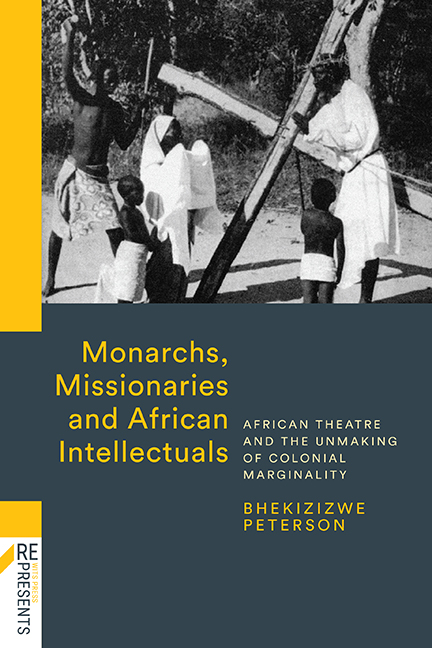 Monarchs, Missionaries and African Intellectuals
Monarchs, Missionaries and African Intellectuals Book contents
- Frontmatter
- Dedication
- Contents
- Preface and Acknowledgements
- Note on Zulu Orthography
- Introduction: Staging the (Alien)nation: African Theatre and the Colonial Experience
- 1 ‘All Work and No Play Makes Civilisation Unattractive to the Masses’: Theatre and Mission Education at Mariannhill
- 2 ‘I Will Open My Mouth in Parables’:Accounting for the Crevices in Redemption
- 3 Parallel Time, Parallel Signs, Discordant Interpretations
- 4 B.W. Vilakazi and the Poetics of the Mental War Zone
- 5 The Bantu Men’s Social Centre: Meeting the Devil on his own Ground
- 6 The Bantu Dramatic Society According to a Gossip Columnist
- 7 Contesting ‘The Bantu Imagination’: The British Drama League & The New Africans
- 8 H.I.E. Dhlomo: Measuring the Distance Between Armageddon and Revolution
- 9 ‘The Black Bulls’: Assembling the Broken Gourds
- 10 Hegemony and Identity: What a Difference ‘Play’ Makes
- Notes
- Bibliography
- Index
6 - The Bantu Dramatic Society According to a Gossip Columnist
Published online by Cambridge University Press: 12 October 2021
- Frontmatter
- Dedication
- Contents
- Preface and Acknowledgements
- Note on Zulu Orthography
- Introduction: Staging the (Alien)nation: African Theatre and the Colonial Experience
- 1 ‘All Work and No Play Makes Civilisation Unattractive to the Masses’: Theatre and Mission Education at Mariannhill
- 2 ‘I Will Open My Mouth in Parables’:Accounting for the Crevices in Redemption
- 3 Parallel Time, Parallel Signs, Discordant Interpretations
- 4 B.W. Vilakazi and the Poetics of the Mental War Zone
- 5 The Bantu Men’s Social Centre: Meeting the Devil on his own Ground
- 6 The Bantu Dramatic Society According to a Gossip Columnist
- 7 Contesting ‘The Bantu Imagination’: The British Drama League & The New Africans
- 8 H.I.E. Dhlomo: Measuring the Distance Between Armageddon and Revolution
- 9 ‘The Black Bulls’: Assembling the Broken Gourds
- 10 Hegemony and Identity: What a Difference ‘Play’ Makes
- Notes
- Bibliography
- Index
Summary
The Bantu Dramatic Society holds the distinction of being the first organisation formed by Africans with the express intention of fostering theatre among Africans. In its rather short lifespan, 1932 to 1940, the Society mounted an impressive number and range of productions. The Society's work has been given rather short shrift by scholars who have tended to dismiss it as elitist and Eurocentric in comparison to the emerging lower-class entertainments of the time, marabi. Such appraisals are rather one-dimensional since they ignore the more crucial dialogic polemic around the aesthetics and themes of African performance that took place between members of the African intelligentsia and white, liberal, cultural philanthropists in the 1930s. It can thus be argued that it is this encounter, rather than some ideologically prescribed perception of what forms African cultural practices should take, that is more informative in understanding the many class and aesthetic textures and tensions that informed the Society during its existence. This chapter attempts to tease out the organisational history of the Bantu Dramatic Society and the myriad social and artistic challenges that the group had to contend with, and which in all probability, led to its rather quick demise. An organisational history is enlightening because it throws to the fore many of the contradictions that still bedevil African groups and practitioners working in theatre today. The key issues concern group dynamics, social relations among members, the ambiguities of their interactions with white practitioners, and, in the last instance, how the Society positioned itself politically as an institution, over and above the content of its plays.
PERFORMING THE ODDS
The Bantu Dramatic Society was formed in June 1932 ‘when a meeting of five people resolved to form themselves into a Dramatic Society’ in order ‘to produce plays, musical comedies, and operas and generally encourage a better knowledge of the Arts of Music and Drama’. The founding mission of the Society gave an incisive indication of the cultural and theatrical preoccupations that were to strain its functioning:
Although the Society will present European plays from time to time, the aim of the Bantu Dramatic Society is to encourage Bantu playwrights and to develop African dramatic and operatic art. Bantu life is full of great and glorious figures that would form the basis for first-class drama.
- Type
- Chapter
- Information
- Monarchs, Missionaries and African IntellectualsAfrican Theatre and the Unmaking of Colonial Marginality, pp. 143 - 164Publisher: Wits University PressPrint publication year: 2021


